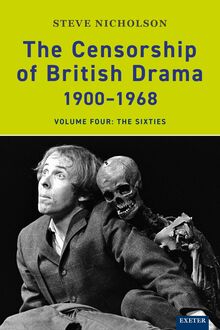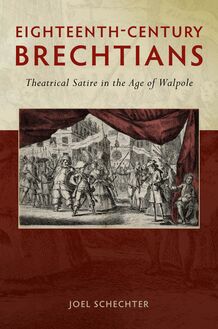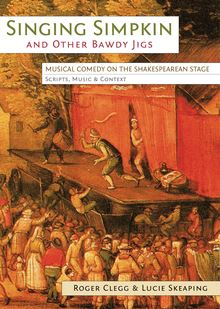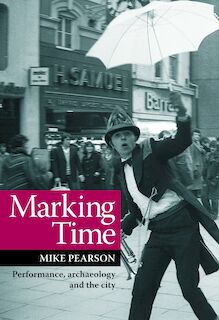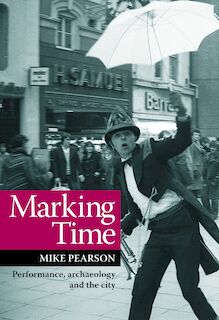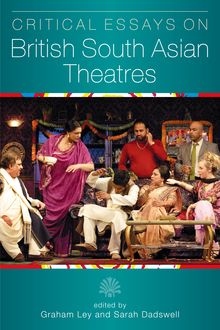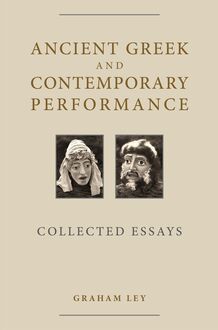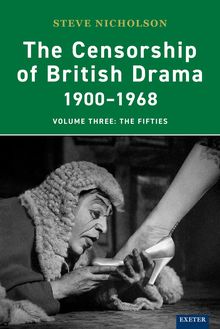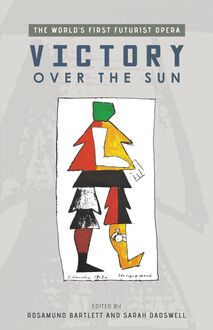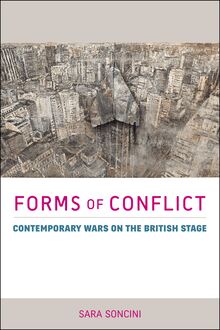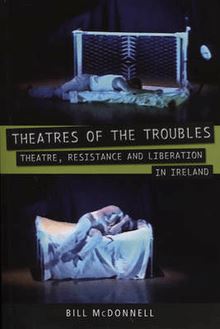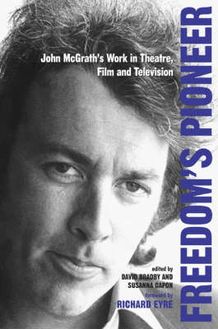Forms of Conflict , livre ebook
222
pages
English
Ebooks
2019
Vous pourrez modifier la taille du texte de cet ouvrage
Obtenez un accès à la bibliothèque pour le consulter en ligne En savoir plus
Découvre YouScribe en t'inscrivant gratuitement
Découvre YouScribe en t'inscrivant gratuitement
222
pages
English
Ebooks
2019
Vous pourrez modifier la taille du texte de cet ouvrage
Obtenez un accès à la bibliothèque pour le consulter en ligne En savoir plus
Publié par
Date de parution
31 juillet 2019
Nombre de lectures
2
EAN13
9780859891080
Langue
English
Forms of Conflict is a full-length study of the representation of contemporary warfare on the British stage and investigates the strategies deployed by theatre practitioners in Britain as they meet the representational challenges posed by the ‘new wars’ of the global era.
It questions how dramatists have responded aesthetically to the changing nature of conflict, focusing on plays written and performed after the September 11 terrorist attacks. Soncini examines how the works of playwrights such as Caryl Churchill, David Hare, Martin Crimp and Simon Stephens have provided an interpretative means to enlarge our understanding of the new patterns of conflict, ensuring theatre’s continued cultural and political relevance.
Forms of Conflict explores the relationship between new forms of warfare and new forms of drama, illustrating what dramatic form can reveal about the post-9/11 landscape and complementing a rapidly growing field of contemporary war studies.
The appendix contains a complete list of war-related plays staged in Britain between 1990 and 2010, with a brief description of their topic and approach.
Acknowledgments
1. Introduction: Scenes of War
2. This is Not a War: Mimesis in the Age of Simulacra
2.1 Presages
2.2 Far away, so close
2.3 Media narratives
3. War without Conflict / Theatre without Drama
3.1 Fragments from a warrior’s discourse
3.2 The rest is silence
3.3 There’s method in this randomness
4. ‘Why Fabulate?’
4.1 Documenting war
4.2 The tribunal play: extending the code
4.3 Uneasy coaltions
5. The Performance of Witnessing
5.1 The talking cure
5.2 The artist is present
5.3 Technologies of recollection
6. Figures of Mediation
6.1 The translation turn
6.2 The mediator’s invisibility
6.3 The combat linguist
6.4 Uncanny bodies
Appendix: New War Plays on the British Stage, 1990-2010
Works Cited
Index
Publié par
Date de parution
31 juillet 2019
Nombre de lectures
2
EAN13
9780859891080
Langue
English
Forms of Conflict
Forms of Conflict is a full-length study of the representation of contemporary warfare on the British stage. It investigates the strategies deployed by theatre practitioners in Britain as they meet the representational challenges posed by the ‘new wars’ of the global era.
Sara Soncini questions how dramatists have responded aesthetically to the changing nature of conflict, focusing on plays written and performed after the September 11 terrorist attacks. Soncini examines how the works of playwrights such as Caryl Churchill, David Hare, Martin Crimp and Simon Stephens have provided an interpretative means to enlarge our understanding of the new patterns of conflict, ensuring theatre’s continued cultural and political relevance.
Forms of Conflict explores the relationship between new forms of warfare and new forms of drama, illustrating what dramatic form can reveal about the post-9/11 landscape and complementing a rapidly growing field of contemporary war studies. An appendix contains a complete list of war-related plays staged in Britain between 1991 and 2011, with a brief description of their topic and approach.
Sara Soncini is a researcher in the Department of Philology, Literature and Linguistics at the University of Pisa. Her research interests include twentieth- and twenty-first-century British drama and theatre, with specific emphasis on the representation of war and conflict, and the aesthetics and politics of intertextual and metatheatrical strategies.
Exeter Performance Studies
Series editors : Peter Thomson, Professor of Drama at the University of Exeter; Graham Ley, Professor of Drama and Theory at the University of Exeter; Steve Nicholson, Professor of Twentieth-Century and Contemporary Theatre at the University of Sheffield.
British Theatre and the Red Peril: The Portrayal of Communism 1917–1945
Steve Nicholson (1999)
Grand-Guignol: The French Theatre of Horror
Richard J. Hand and Michael Wilson (2002)
Freedom’s Pioneer: John McGrath’s Work in Theatre, Film and Television
edited by David Bradby and Susanna Capon (2005)
John McGrath: Plays for England
selected and introduced by Nadine Holdsworth (2005)
Theatre Workshop: Joan Littlewood and the Making of Modern British Theatre
Robert Leach (2006)
Making Theatre in Northern Ireland: Through and Beyond the Troubles
Tom Maguire (2006)
“In Comes I”: Performance, Memory and Landscape
Mike Pearson (2006)
London’s Grand Guignol and the Theatre of Horror
Richard J Hand and Michael Wilson (2007)
Theatres of the Troubles: Theatre, Resistance and Liberation in Ireland, 1980–2000
Bill McDonnell (2008)
British South Asian Theatres: A Documented History
edited by Graham Ley and Sarah Dadswell (2011)
Critical Essays on British South Asian Theatre
edited by Graham Ley and Sarah Dadswell (2012)
Victory over the Sun: The World’s First Futurist Opera
edited by Rosamund Bartlett and Sarah Dadswell (2012)
Marking Time: Performance, Archaeology and the City
Mike Pearson (2013)
Singing Simpkin and Other Bawdy Jigs: Musical Comedy on the Shakespearean Stage
Roger Clegg and Lucie Skeaping (2014)
Ancient Greek and Contemporary Performance: Collected Essays
Graham Ley (2014)
The Censorship of British Drama 1900–1968
Steve Nicholson Volume One 1900–1932 (2003) Volume Two 1933–1952 (2005) Volume Three, The Fifties (2011) Volume Four, The Sixties (2015)
Eighteenth-Century Brechtians: Theatrical Satire in the Age of Walpole
Joel Schechter (2016)
Performing Grand-Guignol: Playing the Theatre of Horror
Richard J Hand and Michael Wilson (2016)
First published in 2015 by University of Exeter Press Reed Hall, Streatham Drive Exeter EX4 4QR UK www.exeterpress.co.uk
© Sara Soncini 2015
The right of Sara Soncini to be identified as author of this work has been asserted by her in accordance with the Copyright, Designs and Patents Act 1988.
British Library Cataloguing in Publication Data A catalogue record for this book is available from the British Library.
Hardback ISBN 978 0 85989 993 2 Paperback ISBN 978 0 85989 994 9 ePub ISBN 978 0 85989 1080 PDF ISBN 978 0 85989 083 0
Typeset in Plantin by Carnegie Book Production, Lancaster
Contents
List of illustrations
Acknowledgments
Preface
1. Introduction: mapping the terrain
New wars? New wars ?.
Frames of violence.
‘Our theatre of cruelty’.
2. This is not a war
Mimesis in the age of simulacra.
Far Away , so close.
Fragments from a warrior’s discourse.
Media narratives.
Nothing outside the (media) text.
There is method in this randomness.
3. ‘Why fabulate?’
Documenting war.
The tribunal play: extending the code.
Uneasy coalitions.
4. The performance of witnessing
The discourse of testimony.
The talking cure.
The artist is present.
Technologies of recollection.
5. Figures of mediation
The translation turn.
The translator’s invisibility.
The combat linguist.
Uncanny bodies.
Conclusion
Appendix: Contemporary wars on the British stage, 1991–2011: the plays
Notes
Bibliography
Index
Illustrations
1. Floating in cosmic darkness: Sam (Ty Burrell) and Jack (Stephen Dillane) in the Royal Court production of Caryl Churchill’s Drunk Enough to Say I Love You? (2006). Photography by Peter Mumford. © Peter Mumford.
2. ‘Images of hell’: Muriel Gerstner’s set for Sebastian Nübling’s production of Pornography (Hanover, June 2007). Photography by Arno Declair. © Arno Declair.
3. The Out of Joint production of Talking to Terrorists (2005): Luton mosque. Photography by John Haynes. © John Haynes/Lebrecht Music & Arts.
4. The Out of Joint production of Talking to Terrorists (2005): ending. Photography by John Haynes. © John Haynes/Lebrecht Music & Arts.
5. Fraz (Andrew Fraser) and Kenzie (Scott Fletcher) emerging from the pool table in the National Theatre of Scotland’s production of Black Watch (2013 international tour). Photography by Manuel Harlan. © Manuel Harlan.
6. ‘Casualties’: Kenzie (Scott Fletcher), Fraz (Andrew Fraser) and The Sergeant (Robert Jack) in the National Theatre of Scotland’s production of Black Watch (2013 international tour). Photography by Manuel Harlan. © Manuel Harlan.
To the memory of my grandfather Cesare Cavagnini, a kind-hearted, peace-loving man who was drafted to fight under Fascist rule and spent the best part of his youth enmeshed in the horrors of war
Acknowledgments
I owe a debt of gratitude to a number of people who have contributed, both directly and indirectly, to my work on this book.
Firstly I would like to thank the friends and colleagues who generously gave their time to read some of the material: Caroline Patey, for her very helpful and encouraging comments on the initial proposal, and Carla Dente and Sylvia Greenup for their invaluable feedback on chapter drafts. The fourth member in this valiant task force, Cristina Cavecchi, was not only an engaged and sympathetic reader throughout my long and protracted grapple with this project, but also an inseparable companion in a long line of brief but invigorating theatre binges in London. Thank you for the good times, my dear Rosencrantz – or is it Guildenstern?
I am very grateful to the series editors at UEP, Peter Thomson, Graham Ley and Steve Nicholson for welcoming this book in the Exeter Performance Studies series and for their expert advice and constructive criticism. In Steve’s case, this acknowledgment must be supplemented with a very heartfelt thanks for his enduring friendship and readiness to help. I am deeply obliged, too, to the anonymous reader who gave such supportive and stimulating feedback on both the proposal and the final typescript, and whose detailed and thoughtful response was a huge boost during the more daunting moments of the writing process. Finally, a big thanks goes out to Simon Baker for his commitment to this project and for his patience in responding to my many queries, and to Helen Gannon for her attention and admirable poise in seeing my bulky typescript through production.
My deepest thanks are due to my family, of course. I am grateful to my parents and in-laws for their day-to-day help and support, both moral and material, and their willingness to provide extra childcare in order to allow me to carve out those all-important visits to theatres and archives in the UK. A very special mention of thanks goes to Alessandro for his liberal supply of love, good sense and lightness, and also for occasionally letting me win at tennis when in desperate need of some cheer (what if I had hit the doldrums more often, though?). Viola and Nina have gracefully waved aside their suspicions about a mother who spends so much time in front of a computer screen yet insists she’s not a game-addict; their trust, forbearance and bounteous cuddling deserves my grateful acknowledgment. Above all, however, I am profoundly thankful to my beautiful girls for making my life so much more complicated, and yet so incredibly simple.
Many thanks, too, to the writers and artists who have contributed with their time and work to the making of this book: to Mimi Poskitt, for providing me with the unpublished script of her documentary piece Yesterday Was a Weird Day and for our lively and enlightening conversation in London back in 2011; to Simon Stephens, for kindly replying via email to my queries about his play, Pornography ; to Peter Mumford, Arno Declair, Manuel Harlan and John Haynes for giving me their photographs to include in the book; and last, but by no means least, to Anselm Kiefer for allowing me to use his astonishingly visionary painting, Lilith as a cover image.
The following people have been of huge assistance in locating material and assisting with reproduction issues: Nadine Koller at the Fondation Beyeler; Eva König at the Atelier Anselm Kiefer; Daria Wallace at the Lebrecht Picture Gallery; and Emma Schad at the National Theatre of Scotland Press Office. I am also very grateful to the staff at the V&A Nation
